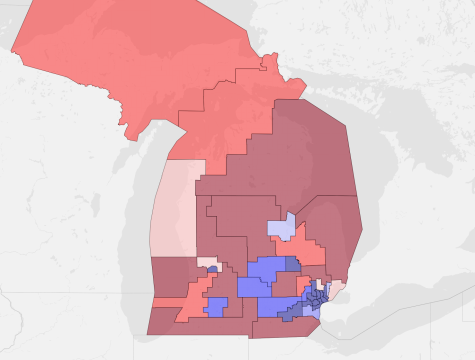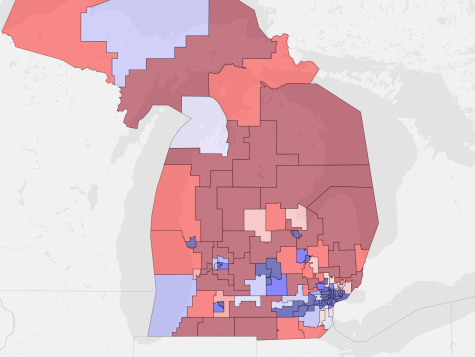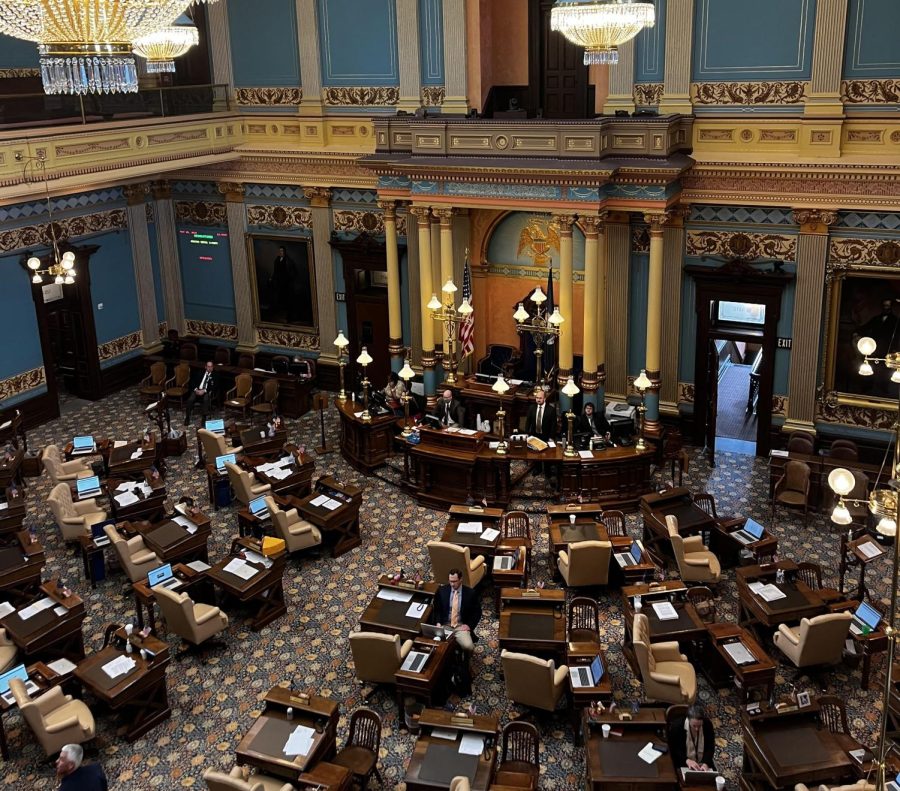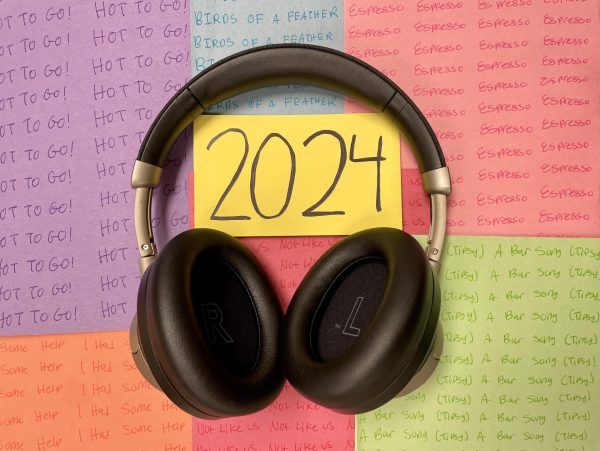Michigan may be a shining blue beacon within a dark red wave
The Michigan Senate Chamber sits empty as most legislators break for lunch. May 19, 2022.
The 2022 midterm elections are fast approaching, and partisan control on all levels of government are headed for a shakeup.
Nationally, the Democratic party, which regained control of the United States House of Representatives in the 2018 elections before also gaining the Presidency and the United States Senate during the 2020 cycle, are likely to be heading for a painful beating.
Republicans are in a strong position to flip control of the United States House of Representatives and potentially even the Senate as well.
Inside of the state of Michigan, however, it is a wonderful time to be a Democrat.
The national scene
As of July 2, 2022, FiveThirtyEight shows the Republican Party leading in the national generic ballot by 2%, meaning that the average polling data shows that 2% of the population is currently more likely to vote for a generic Republican candidate than a generic Democrat candidate.
Meanwhile, president Joseph Biden is continuing to struggle with underwater approval ratings of 15% or more, threatening the popularity and images of Democratic candidates across the country.
Politico ranks the House as likely Republican, while FiveThirtyEight gives the GOP an 87% chance of flipping the chamber.
By and large, House Republicans substantially benefited from redistricting, with aggressive gerrymanders in states such as Florida, Ohio and Texas likely to boost their ranks by double digits.
The Senate remains far more of a tossup, however.
A large number of Republican retirements in swing states such as Pennsylvania, North Carolina, Ohio and Missouri, combined with electorally weak candidates vying to replace them, give Democrats a strong shot at retaining and potentially expanding their Senate majority, even in a difficult midterm environment. In addition, popular Democrat incumbents that maintain higher levels of popularity than the party as a whole, such as Mark Kelly (D-AZ), Maggie Hassan (D-NH) and Raphael Warnock (D-GA) further boost the odds of the party.
As of July 3, Racetothewh, a political forecasting site, gives Democrats a 57.1% chance of retaining the Senate. Democrats are favored to keep every seat they currently hold, and Democrat John Fetterman is slightly favored to flip the open seat created in Pennsylvania when senator Pat Toomey (R) retired.
2021 redistricting within Michigan
Following the 2020 census, all states were required to redraw their legislative and congressional district maps to reflect population changes. As many states rushed to pass the most biased maps they could legally get away with, Michigan bucked the trend and instead passed some of the fairest maps in the nation.
For decades, the state of Michigan has suffered from heavily gerrymandered maps: legislative and congressional districts drawn in a way to ensure that one political party is able to become the clear favorite over another, regardless of the vote totals.
In the 2016 Michigan House of Representatives elections, Democrats won 49.13% of the total vote, compared to 49.2% for the Republican Party. However, due to the gerrymandered maps, the Republican Party won 57% of seats within the chamber, representing a 16 seat advantage.
The Republicans also controlled 71% of the state Senate, despite only winning 49.8% of the vote share in the 2014 midterm elections.
In the 2018 elections, Michigan voters decided that they had enough of gerrymandering, and they voted to pass Proposal 2 with 61.27% of the vote.
Proposal 2 established a constitutional amendment moving redistricting responsibilities away from the partisan state legislature, instead delegating the responsibility to an independent commission composed of a bipartisan group of citizens.

The new commission completed its first round of redistricting in 2021, flipping the electoral situation within the state on its head.
Based on data composited between the 2016 and 2020 elections, there are 15 seats in the state Senate that the Republican Party can consider to be safe or likely, with 16 seats for the Democrats. The remaining seven seats all had a close average vote breakdown, and thus can be considered as battleground districts.
For Democrats, this is a substantial improvement from the previous state Senate map, which contained 14 safe or likely seats for the Democrats, 19 safe or likely seats for the Republicans and only five battleground seats, three of which leaned red.
The state Senate has been controlled by the GOP since 1983.
The situation improved for Democrats in the state House as well.
Under the old maps, only 42 of the 110 seats could be considered safe or likely Democrat, with 52 safe or likely red seats. Of the remaining 16 battleground districts, the Republican party was favored in 10.
Under the new maps, the share of safe or likely Democrat seats went down to 41, but the Republicans now only have 42. Of the staggering 27 battleground districts, 15 lean Democrat.
By our metrics, the GOP is still slightly favored to win the state House, but they are significantly less favored than they have been for decades.
An analysis of the new maps conducted by the Princeton Gerrymandering project slightly disagreed. It calculated 45 safe blue districts to 42 safe red districts, with Democrats favored in 13 of the remaining 23 tossup districts.
The lasting effects of 2018
Despite years of red dominance in the state legislature, the pendulum swung during the 2018 elections, and Democrats experienced massive gains, flipping five of the 110 seats in the state House and five of the 38 seats in the state Senate, while also winning control of the governor’s mansion by a relatively large landslide of 9.6%.
One cannot understand the effects of the 2018 elections on the 2022 elections without first understanding one basic and recurring rule of politics: incumbents (usually) win re-election.
During the 2020 election cycle, 97% of Michigan incumbents won re-election, including 97% of local incumbents, 98% of state legislative incumbents and every single congressional incumbent.
Michigan legislators face term limits. Legislators are only allowed to serve two four-year terms in the state Senate, and House representatives can only serve three two-year terms.
Because of these two factors (the tendency of incumbents to win and term limits that legislators face), the gains that Democrats made in 2018 are still helping them today.
The swing-district incumbents that managed to flip seats in 2018 are still allowed to run for re-election, while the House representatives elected in 2016 and the senators elected in the 2014 red wave are forced to retire.
Of the seven competitive districts within the Senate, three have a Republican incumbent (the 11th, 30th and 32nd), and the other four (the 4th, 9th, 12th and 35th) are open races. This is fantastic news for Democrats, as, provided they avoid a major split-ticket political upset, they would be able to flip the three Senate seats needed to take control of the chamber without having to beat any incumbents and without having to defend any vulnerable incumbents of their own, leaving most available resources to be spent on the offense.

The state House is less advantageous for Democrats than the Senate is, but there are still plenty of bright sides to look at. Under the current composition of the House, Democrats need to flip three additional seats to hold the 56 seats needed for a majority.
Of the 27 battleground districts, 14 (the 27th, 28th, 31st, 38th, 46th, 48th, 54th, 57th, 61st, 62nd, 83rd, 86th, 92nd and 109th), are open races, eight (the 21st, 22nd, 29th, 44th, 58th, 76th, 81st and 84th) are held by Democrats, and five (42nd, 55th, 68th, 96th and 103rd) are held by Republicans.
What do all of these numbers mean? In summary, Democrats are in a very, very strong position to flip the Michigan Senate for the first time in over 40 years; and, while not in quite as strong of a position, they are still in a good place to have a shot at taking back the Michigan House of Representatives, either in 2022 or 2024.
Many Democrats within Michigan consider winning the state Senate to be the more important of the two targeted chambers; if Democrats fail to flip the House, they can simply try again in 2024, but if they fail to flip the Senate in 2022 they must wait four years until 2026, at which point the political climate could be radically different.
The fight for the executive branch
One last major factor impacting the control of Michigan’s government is yet to be discussed: the executive offices, specifically the gubernatorial election.
Incumbent Governor Gretchen Whitmer, a Democrat, received some wonderful news on the night of May 23, 2022, when the state elections bureau stated that five Republican candidates, including former Detroit Police Chief James Craig and businessman Perry Johnson, the leading frontrunners, did not turn in enough valid signatures to qualify for the August primary election ballot.
According to a report by the bureau, around 68,000 invalid signatures were found across ten sets of nominating petitions. The bureau identified 36 paid circulators who submitted entire sheets of fraudulent signatures.
The former candidates maintain the claim that they had no knowledge of the attempted forgery.
Now, Michigan Republicans were in a real pickle. Craig had been the presumptive nominee for months, and now the GOP was left scrambling at the 11th hour before the August 2 primary to find a candidate with enough name recognition to challenge an up-and-coming democratic superstar like Whitmer.
To further complicate the situation for the GOP, candidate Ryan Kelly, the slight leader in a June 13 Detroit Free Press primary election poll, was arrested and charged with both four misdemeanor counts and a charge of willingly injuring or committing depredation against any property of the United States, all of which stem from his participation in the January 6 insurrection.
Assuming Kelly does avoid conviction until the election, his involvement in the attempted coup is likely to severely harm Republicans throughout the state in the general election.
Racetothewh shows the primary election in a statistical deadlock. As of July 3, they give Kelly a 31.2% chance of winning the nomination, businesswoman Tudor Dixon a 28.5% chance, and businessman Kevin Rinke a 24.2% chance. PredictIt, a research project of the Victoria University of Wellington which functions as a stock market simulator for election outcomes, disagrees, giving Dixon the best odds with Kelly running up as the 2nd most likely nominee.
Regardless of whether the nominee is Dixon, Kelly, Rinke, or even chiropractor Garrett Soldano, Michigan Republicans are still in trouble.
A poll conducted by Target Insyght shows Whitmer with a mind boggling lead over all of her potential challengers. In this particular poll, she is leading Kelly by 57%-23%, Dixon by 58%-21%, Rinke 58%-24% and Soladno 58%-22%. The same poll showed Attorney General Dana Nessel leading Matt Deperno, her Republican challenger, by 54%-23%, and Secretary of State Jocelyn Benson leading GOP challenger Kristina Karamo by 56%-23%.
Also in this poll, 54% of respondents stated that they approved of Whitmer’s job performance, with 52% approving of Benson and 50% approving of Nessel.
Both Karamo and DePerno have been endorsed by former president Trump, and both deny the legitimacy of the 2020 election; Karamo has in the past appeared at rallies supporting the QAnon conspiracy theories.
This poll isn’t alone in its results, either. An earlier Detroit News survey confirmed that Whitmer holds large leads of 15% or more over her opponents, with relatively strong approval ratings for all of the incumbent Democrat executive offices.
However, this lead is not likely to hold. After the primary, the Republican party is likely to settle and embrace the nominee, which will both increase the name recognition of the eventual nominee and likely close the polling gap. However, Whitmer is in a strong position headed into the election regardless
In terms of fundraising for the executive races, Democrats can again find solace. According to TransparencyUSA, Whitmer has so far raised $14 million for her re-election bid. Meanwhile, Rinkie has raised about $2 million, Soldano has raised $1.37 million, Dixon has raised $500,000; Kelly has raised a mere $98,000.
For the Secretary of State election, Benson has raised $1.5 million compared to Karamo’s $228,000, and for the Attorney General race Nessel has raised $1.85 million compared to DePerno’s $191,000.Racetothewh gives Whitmer an 80.3% chance of winning re-election, FiveThirtyEight gives her a 91% chance of winning re-election and PredictIt gives her 78:23 odds of winning, leaving Michigan Democrats in a very strong position going into 2022.
Your donation will support the student journalists of Salem High School - MI. Your contribution will allow us to purchase equipment and cover our annual website hosting costs.

RJ Doroshewitz is a senior at Salem High School who has a wide variety of interests. In the fall, he'll be attending George Washington University in downtown...












